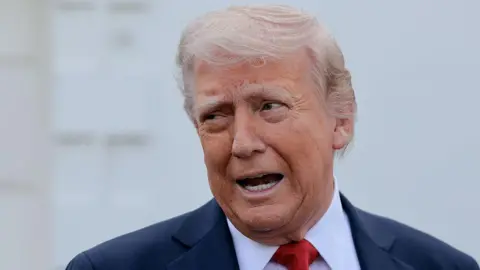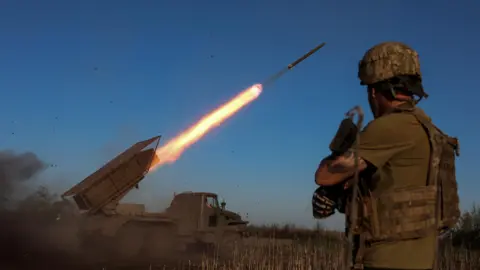BBC News, Washington DC
 Getty Images
Getty ImagesUS President Donald Trump has accused Volodymyr Zelensky of harming peace negotiations, after the Ukrainian president said Kyiv would not recognise Russian control of Crimea.
Writing on Truth Social, Trump claimed a deal to end the war was “very close”, but that Zelensky’s refusal to accept US terms “will do nothing but prolong” the conflict.
Earlier, US Vice-President JD Vance laid out the US vision for a deal, saying it would “freeze the territorial lines […] close to where they are today”.
Ukraine has long said it will not give up Crimea, which was illegally annexed by Russia in 2014.
Vance said the deal would mean Ukraine and Russia “are both going to have to give up some of the territory they currently own..”
Zelensky immediately shot down the idea.
“There’s nothing to talk about here. This is against our constitution,” he said.
Later, after Trump called Zelensky’s remarks “inflammatory”, the Ukrainian president said: “Emotions have run high today.”
Recognising Russia’s illegal occupation of Crimea would not only be politically impossible for Zelensky to accept, it would also be contrary to post-war international legal norms that borders should not be changed by force.
The comments from Trump and Zelensky are the latest chapter in an often fractious relationship.
In February, the pair clashed in a fiery meeting in the Oval Office.
Trump repeatedly said on the campaign trail he could end the Ukraine-Russia war in one day, but as he approaches his 100th day in office a truce remains elusive.
After Trump’s remarks, White House Press Secretary Karoline Leavitt said: “The president is frustrated. His patience is running very thin.”
Trump was not asking Ukraine to recognise a Russian-controlled Crimea, she said before saying, “Zelensky seems to be moving in the wrong direction.”
Vance warned on Wednesday that the US would “walk away” from its deal-making role if Russia and Ukraine do not come to an agreement – echoing comments last week by Trump and US Secretary of State Marco Rubio.
US officials also pulled out of a London meeting to focus on talks in Moscow, as the pace of diplomacy to end the war quickens.
The London talks between officials from the UK, France, Germany, Ukraine and the US aimed at securing a ceasefire were downgraded this week after Rubio and special envoy Steve Witkoff pulled out.
Instead, Trump’s Ukraine envoy Gen Keith Kellogg attended the talks in London, and Witkoff will head to Russia to meet President Vladimir Putin for the fourth time.
British diplomats said they were not entirely clear why Rubio and Witkoff had pulled out of the London talks.
The US state department blamed logistical reasons, but it was clear the decision was last-minute and left the Foreign Office wrongfooted.
Speaking to BBC Radio 4’s Today programme, Yuriy Sak, an adviser to Ukraine’s ministry of strategic industries, said Ukrainian negotiators would attend the London meeting on a “very clear, narrow mandate” to achieve a ceasefire that will “pave the way for further talks”.
Russia intensified its attacks on Ukraine on Wednesday, after a brief lull over Easter when it halted air strikes.
Nine people were killed and dozens more wounded in the eastern Ukrainian city of Marhanets when a Russian drone hit a bus carrying workers.
Putin called a temporary ceasefire for the Easter weekend but UK Defence Secretary John Healey told the House of Commons on Tuesday that British military intelligence had found no evidence of a let-up in attacks.
“While Putin has said he declared an Easter truce, he broke it,” he said. “While Putin says he wants peace, he has rejected a full ceasefire; and while Putin says he wants to put an end to the fighting, he continues to play for time in the negotiations.”
It is estimated that hundreds of thousands of people have been killed or injured on all sides since Russia invaded Ukraine on 24 February 2022, and nearly seven million Ukrainians are currently listed as refugees worldwide.
The conflict goes back more than a decade, to 2014, when Ukraine’s pro-Russian president was overthrown. Russia then annexed Crimea and backed militants in bloody fighting in eastern Ukraine.
 Reuters
Reuters


